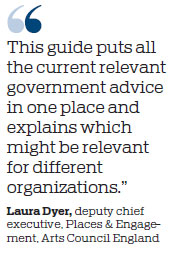Bleak Brexit picture faces UK arts
With nine weeks to go until Britain is due to leave the European Union, the Creative Industries Federation, the body which represents the United Kingdom's creative industries, has called on political parties to support a second referendum rather than crash out of the European Union.
As with many other industries in the UK, the arts and culture sector has been planning ahead for the potential impact of Brexit.
Earlier this month, British Prime Minister Theresa May's Brexit deal, which set out the terms of the UK's exit from the EU on March 29, was rejected by 432 votes to 202, the largest defeat for a sitting government in history.
But with the threat of a no-deal Brexit looming closer, the federation stressed steps must be taken to "avoid this most damaging outcome".
"We have now reached an undeniable cliff edge, and it is imperative that our political parties do what is necessary to prevent the extreme damage that will be caused if we crash out of the EU," Alan Bishop, chief executive of the federation, said.

A poll by the federation found 96 percent of its members voted remain in the 2016 referendum and it warned of "catastrophic consequences for the sector" if the UK left without a deal.
The federation said the creative industries are the fastest growing part of the UK's economy and contribute more than 100 billion pounds ($130 billion) in gross value added.
"The free movement of goods, services, capital and people have underpinned the sector's success and our ability to attract talent, tour freely, and trade on our doorstep is vital to the ongoing success of the creative industries and to the UK as a whole," Bishop added.
In the federation's Global Trade Report, 40 percent of the UK's creative industries stressed that a no-deal scenario would harm their ability to export, while 21 percent would consider moving all or part of their business to the EU or elsewhere in the event of a no-deal.
Among the concerns is that cultural organizations will no longer have access to funding for projects under EU programs.
According to a 2017 British Council report, art groups in the UK received nearly 17 million pounds a year from the EU's Creative Europe funding program.
Meanwhile, Arts Council England, a non-departmental public body of the Department for Digital, Culture, Media and Sport, published a guide in the event the UK leaves the EU without a withdrawal agreement.
This guide signposted some government notices and policy papers that will help arts and cultural organizations prepare for a no-deal Brexit.
Arts Council England said cultural organizations should assess the risk and opportunities created by Brexit in order to prepare for it as well as possible.
"This guide puts all the current relevant government advice in one place and explains which might be relevant for different organizations," Laura Dyer, deputy chief executive, Places & Engagement, Arts Council England, said. "I hope it will help organizations decide what actions to take in preparation for a no-deal outcome."
The list of information includes EU funding for projects under EU programs such as Creative Europe, the European Regional Development Fund and Horizon 2020 among others. It also includes policy on EU citizens' rights in the UK for organizations employing EU nationals, and on traveling to the EU post-Brexit.
The guide also lists implications for those who are moving works of art or instruments and equipment across borders and the likely effects on copyright and intellectual property rights.
"It is important arts and cultural organizations are prepared for the possibility of a no-deal scenario. As the development body for the arts, museums and libraries we want to do all we can to help them do that," Dyer added.
Brexit is also expected to hit UK museums with import taxes and massive cuts in research funding.
Bernard Donoghue, the director of the Association of Leading Visitor Attractions, warned that the government would be highly unlikely to replace EU funding for museums and the arts in the event of a no-deal Brexit.
He told Museums Journal that "all museums and galleries in the UK have really benefited from being able to access EU cultural funding, whether that's in terms of supporting temporary exhibitions or touring exhibitions or bringing together a network of workers, curators or programmers".
In memos released under Freedom of Information, London's Victoria & Albert Museum could be slapped with a bill for 25 million pounds due to new import taxes on future exhibits and faces a cut in visitor numbers as well as staff shortages.
The Natural History Museum is faced with a loss of 2 million pounds in research funding and predicts a 15 percent decline in visitor numbers which will wipe out up to 2.4 million pounds in revenue.
The National Museums Liverpool also expressed concern over importing foreign artworks, falling tourist numbers and staffing shortages, warning the visa and customs issues could affect costs and impact programs.
But there are some in the cultural community who have voiced their support for Brexit.
Manick Govinda, a founding member of the Artists 4 Brexit group, said during a debate in 2017 that he thought Brexit will be good for artists because the EU "is an apparatus that fundamentally restricts freedom of movement for non-EU citizens. The EU has created a Fortress Europe".
"We do need to think bigger, and increase movement and our reciprocal relationships with other countries," he added. "So why not South Korea, India, Ghana, Kenya, New Zealand, Australia, the Caribbean or the United States?"
boleung@mail.chinadailyuk.com
(China Daily 01/25/2019 page3)














